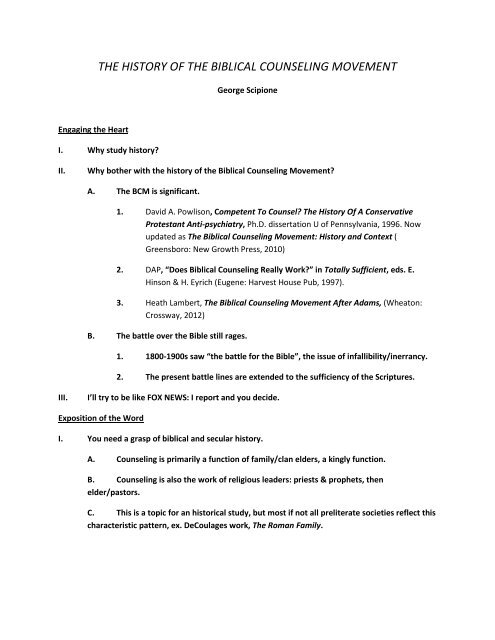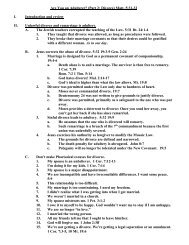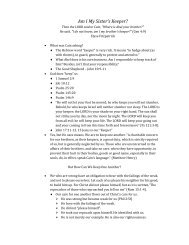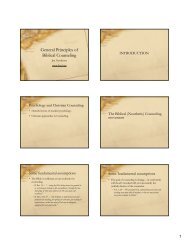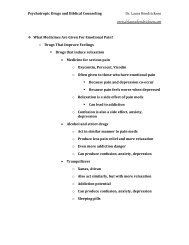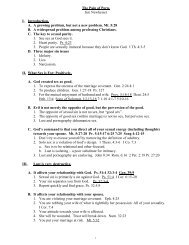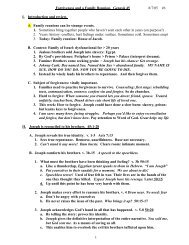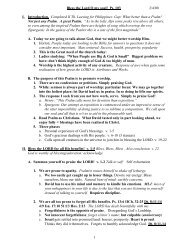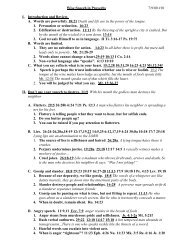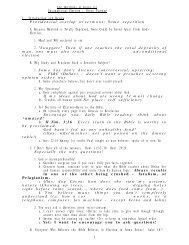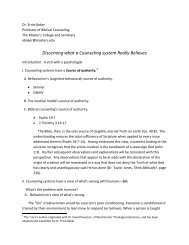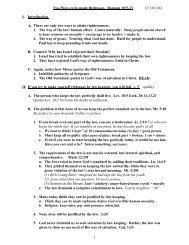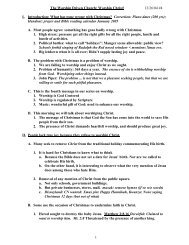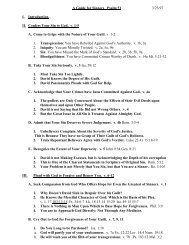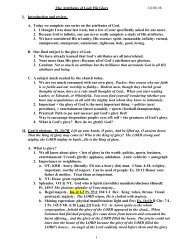scipione.the-history-of-the-biblical-counseling-movement-outline
scipione.the-history-of-the-biblical-counseling-movement-outline
scipione.the-history-of-the-biblical-counseling-movement-outline
You also want an ePaper? Increase the reach of your titles
YUMPU automatically turns print PDFs into web optimized ePapers that Google loves.
THE HISTORY OF THE BIBLICAL COUNSELING MOVEMENT<br />
George Scipione<br />
Engaging <strong>the</strong> Heart<br />
I. Why study <strong>history</strong>?<br />
II.<br />
Why bo<strong>the</strong>r with <strong>the</strong> <strong>history</strong> <strong>of</strong> <strong>the</strong> Biblical Counseling Movement?<br />
A. The BCM is significant.<br />
1. David A. Powlison, Competent To Counsel? The History Of A Conservative<br />
Protestant Anti-psychiatry, Ph.D. dissertation U <strong>of</strong> Pennsylvania, 1996. Now<br />
updated as The Biblical Counseling Movement: History and Context (<br />
Greensboro: New Growth Press, 2010)<br />
2. DAP, “Does Biblical Counseling Really Work?” in Totally Sufficient, eds. E.<br />
Hinson & H. Eyrich (Eugene: Harvest House Pub, 1997).<br />
3. Heath Lambert, The Biblical Counseling Movement After Adams, (Wheaton:<br />
Crossway, 2012)<br />
B. The battle over <strong>the</strong> Bible still rages.<br />
1. 1800-1900s saw “<strong>the</strong> battle for <strong>the</strong> Bible”, <strong>the</strong> issue <strong>of</strong> infallibility/inerrancy.<br />
2. The present battle lines are extended to <strong>the</strong> sufficiency <strong>of</strong> <strong>the</strong> Scriptures.<br />
III.<br />
I’ll try to be like FOX NEWS: I report and you decide.<br />
Exposition <strong>of</strong> <strong>the</strong> Word<br />
I. You need a grasp <strong>of</strong> <strong>biblical</strong> and secular <strong>history</strong>.<br />
A. Counseling is primarily a function <strong>of</strong> family/clan elders, a kingly function.<br />
B. Counseling is also <strong>the</strong> work <strong>of</strong> religious leaders: priests & prophets, <strong>the</strong>n<br />
elder/pastors.<br />
C. This is a topic for an historical study, but most if not all preliterate societies reflect this<br />
characteristic pattern, ex. DeCoulages work, The Roman Family.
II.<br />
You need a grasp <strong>of</strong> <strong>the</strong> Protestant Reformation’s gifts to <strong>counseling</strong>.<br />
A. The ancient pattern continues but now a Scripture based <strong>counseling</strong> model develops.<br />
It is <strong>biblical</strong> in content and methodology. The Puritans did much in this area.<br />
B. Satanic substitutes exist, both secular (Medical model that arises out <strong>of</strong> a deistic view<br />
<strong>of</strong> <strong>the</strong> universe) and sacred (heretical).<br />
III.<br />
You need a grasp <strong>of</strong> <strong>the</strong> modern era.<br />
A. 1750-1900 Psychology develops as an empirical science as opposed to philosophical<br />
anthropology.<br />
B. 1900-1950 Psychology develops major schools and many <strong>of</strong>fshoots. Through Harry E.<br />
Fosdick and Norman V. Peale psychology sweeps over <strong>the</strong> liberal churches, CPE etc.<br />
C. 1950-1970<br />
1. Mainline churches business as usual, Robert Schuller.<br />
2. National Association <strong>of</strong> Evangelicals<br />
3. Clyde Narramore et. al. move psychology into <strong>the</strong> evangelical churches.<br />
D. 1965-present Jay E. Adams triggers <strong>the</strong> BCM.<br />
1. 1965-1970 Adams develops a new/<strong>biblical</strong> model: Mower, WTS/P, CCEF,<br />
Competent to Counsel.<br />
2. 1970-1979 Adams writes major texts; Wayne Mack<br />
3. 1980-1989 The expansion <strong>of</strong> evangelical psychology: “Integration &<br />
Inundation” DAP. Fuller, Rosemead, Wheaton, West. Cons. Baptist, Dallas.<br />
4. 1990-present Maturing & stabilization <strong>of</strong> <strong>the</strong> BCM.<br />
IV.<br />
You need to grasp <strong>the</strong> present developments in <strong>the</strong> BCM.<br />
A. The evangelical church scene.<br />
1. CAPS/AACC<br />
2. Criticism: M. Horton; Os Guiness; D Wells<br />
3. Christian Psychology sobering.
B. BCM developments: main line<br />
1. CCEF/Westminster –P; Journal <strong>of</strong> Biblical Counseling<br />
2. NANC<br />
3. The Master’s College/Seminary<br />
4. SBC: Sou<strong>the</strong>rn; Sou<strong>the</strong>astern; Southwestern<br />
5. Smaller Reformed Seminaries: RPTS; Greenville PTS; Mid-America; PRTS<br />
6. Local Churches: ex, Faith Baptist Church, Lafayette, IN; RBCTI & INS, Moore, SC<br />
C. O<strong>the</strong>r developments influenced by <strong>the</strong> BCM.<br />
1. BCF: John Broger<br />
2. IABC: Ed Bulkley<br />
3. Trinity Theological Seminary, Newberg, IN<br />
4. Bobgans/Hunt<br />
V. You need to evaluate <strong>the</strong> Biblical Counseling Movement.<br />
A. The pluses and minuses: see for <strong>the</strong> 2012 Workshop “THE IMPORTANCE OF THE LOCAL<br />
CHURCH”.<br />
B. Powlison’s evaluation<br />
C. Lambert’s evaluation<br />
D. Scipione’s evaluation <strong>of</strong> A-C<br />
Exhortation for Life<br />
I. The BCM is significant.<br />
A. The church existed w/o it for millennia.<br />
B. But, like <strong>the</strong> Protestant Reformation it is a call to fidelity to <strong>the</strong> gospel and to <strong>the</strong><br />
Scriptures.<br />
II. The BCM may be used <strong>of</strong> God to help <strong>the</strong> church as it struggles with <strong>the</strong> worldly influences in<br />
<strong>the</strong> dying embers <strong>of</strong> western civilization.


